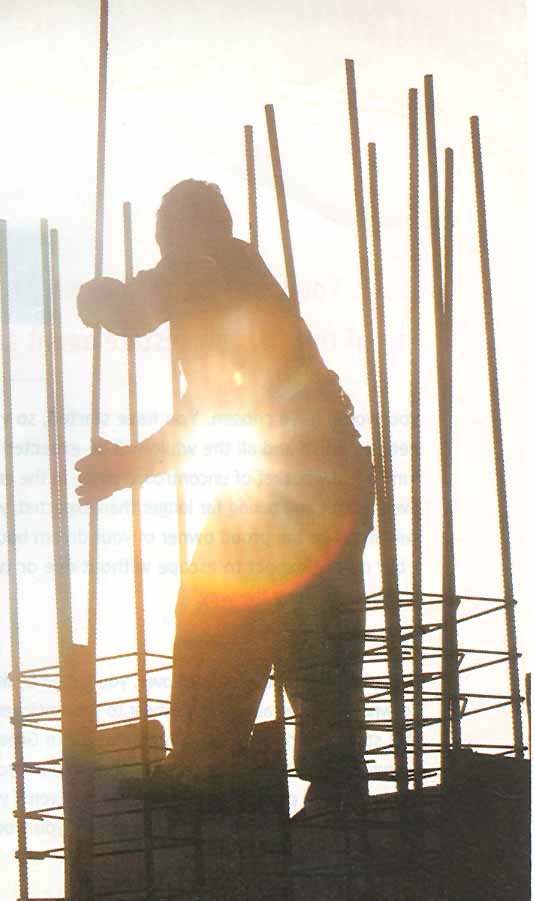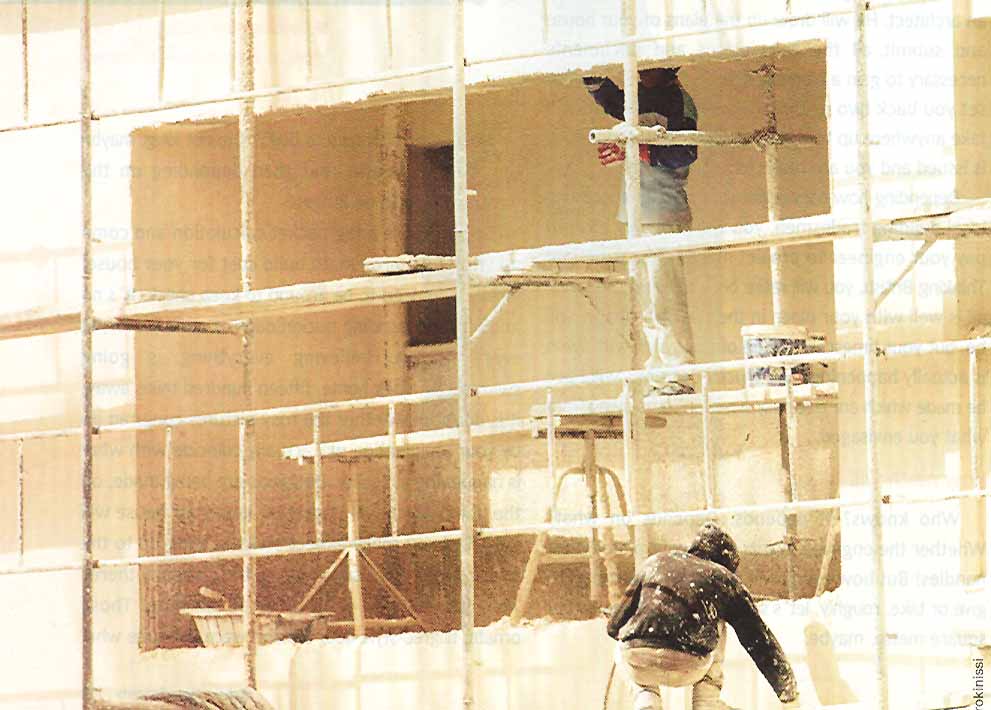 |
||
|
Building a Dream - or a Nightmare!
|
||
|
It won't be cheap, it will take a long time and require forests of paperwork and constant overseeing of every detail, but you might just end up with your ideal home By Michael Saunders |
 |
|
| Can you better it? A place in the sun? Wonderful weather, a lifestyle you could only dream about back in Britian. Low crime, low cost of living - and no council tax to speak of! Owning a house in Greece, whether on the mainland or one of its island can be an absolute paradise. But where do you start in having your dream house built? Do you buy from a development company? Idealy, look for one recognized by an organization such as FOPDAC - the UK federation that protects the interests of those buying property abroad. Or do you go the independent route? With the British culture of buying cheaper, it's obvious you're quids in if you buy land and have a house built yourself - aren't you? Just visit the village kafenio a couple of times, or stay at a small hotel stating you want to build a, home, and suddenly you find yourself with a new best friend who can't do enough for you. Sprinkled with fairy dust, seduced by bonhomie, you suddenly find yourself a prime target for every man and his dog to sell you the perfect plot.
"Psst. You want land? I have big piece, very cheap." This is the mating call of the amateur estate agent as he whispers conspiringly in your ear. What is it, the sun, the raki? A stranger buys you a drink and tries to sell you a piece of land. Can you imagine that scenario happening in your local pub back in the UK? Of course not. So why do people fall for it here? Don't be seduced by the conviviality and be led up the garden path to sign your life away and then discover the awful truth - when it is too late. I know of some who have bought land, but cannot build because they don't own the olive trees upon it. Others have a plot without access to a road and therefore won't obtain planning permission, while someone else bought an olive grove but because it was outside the village boundary, they couldn't build there. And they all went ahead, like lambs to the slaughter, because they had a new best friend. So you want to have your dream house built? Let's start with a blank canvas. Forget a lifetime of thinking British. That experience doesn't apply here. It's a foreign country, so don't surmise things happen the way they do back home. |
||
|
Can you build? Right, so you've found a plot of land and your seller will be adamant that you can build your house on it. However, is it inside or outside the village boundary? The owner must have a topographic survey of the land in order to sell it. This is a map of the plot, depicting accurate measurements and showing the names of all those owning land on your boundary. The survey will also confirm your plot's position on the village plan. If the land is outside the dotted boundary line then you must be sure the plot is in excess of 4,000 square metres - and it must have access from an existing road. Providing this is so, then you will probably be able to build a house, although there will also be constraints where you can actually position the building. Inside the village limit you will invariably have far greater build capability, which means you can buy a much smaller plot, but it will cost you far more per square metre. |
 Building your place in the sun: step by step, cheque by cheque |
|
|
|
||
 |
Whose is it? Hurrah, you've agreed a price with the owner, but is he the only one with a stake on your land? Traditionally, whole members of a family can own one plot of land - and some may live in Australia, or Canada. Just to make matters a little more stressful, all the owners have to sign the contract, which means those in distant lands will have to give a power of attorney for someone to act on their behalf. Meanwhile, you will have had to go the tax office, and wait to take a Greek tax number, which is a legal requirement when buying land in Greece. Come the day for the contract signing at the notary's office, it will all be in Greek. Don't expect a translation, apart from a brief explanation by your lawyer. The contract will be some eight pages or so long, detailing who you are, your mother's name, your father's name, where the land is, who owned it, what size it is, your inside leg measurement and the price, which will be a whole lot less than the agreed figure. Don't think British - it's a tax thing! Don't worry; every minute detail goes into the contract to ensure you will have total ownership of an unencumbered plot of land. |
|
|
Once the contract has been read, then is the time to bring out your plastic supermarket bag, stuffed with dosh. The sellers will confirm how much money they want. I don't want to stress you, but it has been known for the price to be jacked up at this stage, or it will suddenly transpire that they were talking in drachmas and not in euros! The lawyer will count the money and so will everyone else. Once it has been agreed that all the loot is present and correct, everyone signs the contract, and with much congratulatory hand-shaking, the land is now yours. What's the plan? There's no time for a liedown, you now have a house to build! Firstly, you must appoint a mihanikos- a structural engineer, who invariably doubles up as an architect. He will draw up the plans of your house and submit all the calculations and documents necessary to gain a planning licence. This will probably set you back two or three thousand euros and will take anywhere up to three months before the licence is issued and you are ready to build. Depending how conversant you are with appointing '" local building tradesmen, you will probably have to pay your engineer to project manage construction. Thinking British, you will retire back to Blighty believing all is well with your place in the sun. It probably will be, but your timescale will be out of synch with what is actually happening, and crucial decisions will have be made which are culturally a million miles away from what you envisaged. How much will it cost? Who knows? It depends. Depends on what? Whether the engineer wants to fit gold-plated door handles! But how much will it cost? Approximately, give or take, roughly, let's say 1,200 - 1,500 euros per square metre, maybe. How long will it take to build? Oh, not long, maybe ten, twelve months, but then depending on the weather, it could be longer. So you make a fag packet calculation and come up with an approximate build cost for your house. Ideally, you need to be around to keep check. It' it's no good blithely sending bucketloads of money over, at every behest, believing everything is going swimmingly. Back home, fifteen hundred miles away, it is doubtful whether the rosy pictures conjured up by your imagination will actually coincide with what is happening in reality. Decisions are being made, on the hoof, which will impact on how your house will look. Did you really expect stairs leading up to the house? Was there supposed to be a balcony there? They just seemed good ideas at the time! Those ornate, filigree-style door handles were not quite what you would have chosen. You have started, so you need to finish and all the while will be expected to fund a leaky bucket of uncontrolled costs. In the end, over budget and taking far longer than expected, you will finally be the proud owner of your dream house but do not expect to escape without one or two nightmares along the way. By now, it is more than likely that two years will have elapsed from the day you found your perfect plot of land to when you finally turned the key in the door of your dream home - albeit at a higher cost than you imagined. Did you save money by building your own house? Probably not. Would it have been more stress-free to have bought from a development company, able to give you a fixed price? Probably - but that's another story. |
||
HCS readers can view other excellent articles by Michael Saunders in our extensive, permanent archives at the URL http://www.helleniccomserve.com./contents.html
All articles of Athens News appearing on HCS have been reprinted with permission. |
||
|
||
|
2000 © Hellenic Communication Service, L.L.C. All Rights Reserved.
http://www.HellenicComServe.com |
||

